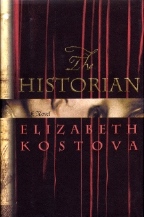The Historian, Elizabeth Kostova

First of all, I started off with The Historian, by Elizabeth Kostova.
I first heard about this novel when Ms. Kostova came to Laramie to do a reading from this book. I, like a good lit student, missed it for whatever reason, but filed the book away for later digestion.
When I got a circular from The Science Fiction Book Club via my Wizard subscription, I decided to do the risky and sign up for it so I could, in part, get a copy of The Historian for something like half a buck.
Then the book sat on my shelf for several months.
Realizing that I was going to be in a car for several hours at a time, plus far from house and home (and the internet), I decided to pack up my briefcase with mentally digestible goodies; The Historian was one of these treats.
Surprised at how quickly I was absorbed into the world of history and vampires, I spent a good amount of time with this book.
Kostova, here, captures the delicacy of the Dracula legacy right where it intertwines with the Vampire legends, giving us a stunning portrayal of who Vlad Ţepeş was and how he would be in undeath.
The story is told by three historians in a non-linear fashion. Our primary narrator (historian number 1) finds several suspicious books and papers in her father (historian number 2)'s library and, when confronted about them, he tells the story of his college adviser (historian number 3). Slowly, we begin to see a sort of feverish lineage that is being passed down—historian number 3 receives a mysterious book that sets him off looking for Dracula's tomb. Many years later, historian 2 receives a similar book, and shows it to number 3, who begins to tell his story to number 2, which, eventually sends number 2 off on an adventure to find number 3, who is now missing. Meanwhile, number 1 is, many years later, gleaning this story from number 2, who is not proceeding quickly enough. When number 2 disappears, number 1 is left with letters discussing both number 2's story as well as number 1's, which gives us three separate narrative threads, all bound together.
And never once do you become as confused as you are after reading that paragraph.
We're taken all over Eastern Europe, from Amsterdam to Ţepeş' native Wallachia (not Transylvania, the other part of Romania) to Budapest in the search of Dracula's tomb and, essentially, Dracula himself.
I like to think of this as an essential vampire novel, on the other side of the spectrum from Anne Rice's Vampire Chronicles—this is a story of humans versus vampires, like Bram Stoker's original Dracula, rather than the tale of vampires themselves.
The book is very, very literate—never once are you shaken by a poorly crafted turn of phrase; Kostova has in her the ability to create a flowing narrative that is something different from my usual reads of Ellis or Gaiman; in essence, I think this book has the ability to reach that 'modern classic' stigma that you hear so much about.

0 Comments:
Post a Comment
<< Home